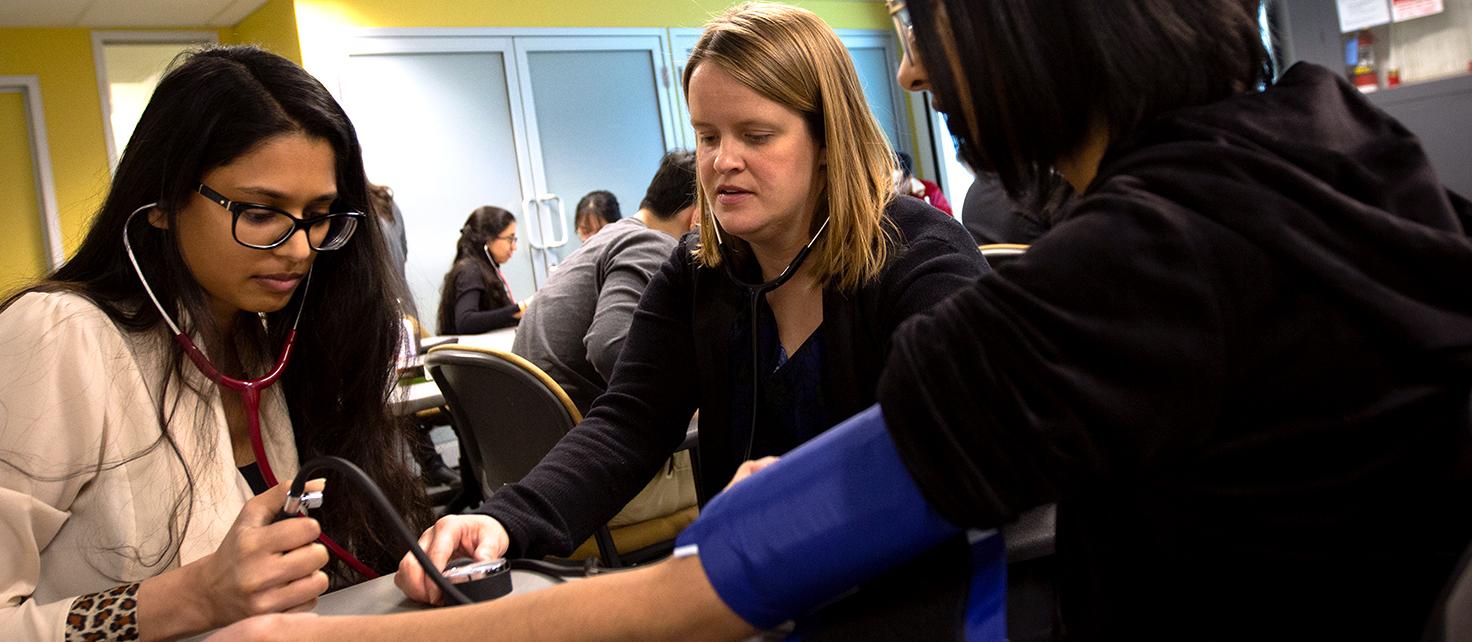January is Mentorship Month, a time to celebrate the professional and academic connections that are key to the success of our community. In this Q&A, Natalie Crown, Director, Doctor of Pharmacy Program and Assistant Professor at the Leslie Dan Faculty of Pharmacy, shares the challenges and opportunities the pandemic has presented, and how being both a mentor and mentee has helped her stay motivated.
The pandemic has simultaneously been an incredibly disruptive challenge and an opportunity for pharmacists to play a key part in the healthcare response. How has your understanding of mentorship changed or shifted during this time?
I think the pandemic has made certain aspects of the mentee/mentor relationship more important. For me, an important feature of mentorship is connections. I believe a good mentor truly cares about the success of their mentee and takes meaningful actions to support their success. I’ve also recently heard a mentor role described as a “professional parent role”. While that may not be entirely accurate, I like the idea of someone who gives you unconditional support in a professional environment, guiding you, providing you with feedback, and showing compassion and caring even when you make mistakes. Being compassionate, caring, and showing kindness towards ourselves and others has become even more important to me during the pandemic.
The power of reflection has also taken on renewed importance for me these past few months. Recently, I was describing a challenging situation to a mentor, and having them guide me in reflection without judgement or without feeling the need to make recommendations, helped me see aspects of the issue that weren’t immediately obvious to me.
How have you and other faculty members worked to keep students motivated?
I think it’s important to start by acknowledging we understand how difficult it can be to stay motivated in deeply challenging times. In developing our guiding principles for course delivery in the PharmD program during the pandemic, we adopted a few design features we thought would help students stay connected during virtual learning. They include suggestions like recording introduction videos and making content available in different formats (live and recorded lectures), building in flexibility where we can, and introducing smaller weighted assessments (like mini quizzes) that give students regular feedback on their performance throughout the term.
I also know many of our faculty, including myself, are incorporating check ins with students, through virtual office hours and using the beginning of lectures. Some of our faculty have been very creative in their approach to online engagement, using techniques like gamification and active learning strategies, like team-based learning.
We’ve also seen the benefits that online lectures offer. Many students who might not usually ask a question in a large lecture hall feel more comfortable participating using the chat function in virtual classes. Our team worked hard to open our study spaces early. We recognize how important it is for students to be able to connect safely in person, as creating community is important to keeping each other motivated.
Professor Crown works with students during second year pharmacy course focused on physical assessments in 2019.
When have you drawn inspiration from students?
Over the past few months, I have been fortunate to precept two fabulous 4th year PharmD students in APPE education rotations. Despite the personal and professional challenges we are all experiencing, both students showed up enthusiastic and positively approached any situation and task they were presented with. They offered fresh perspectives to the work and helped me move several key education projects forward. Positive energy and enthusiasm are contagious, and even though as a preceptor I was responsible for guiding their skill development, the truth is I gained energy and motivation from working with them.
I have also been so inspired about our students throughout our immunization training. At the Leslie Dan Faculty of Pharmacy, we recognized the societal needs that COVID presented – namely the need to train our students as immunizers, but also teach knowledge and skills to serve as public health advocates to promote the vaccination efforts. In the fall of 2020, more than 70 per cent of our second-year class (Class of 2T3) took the opportunity to complete their injection training early – effectively taking on more work in an already demanding fall term. Then, we quickly offered the same the training to our incoming second year class (Class of 2T4) in June 2021. This hadn’t been done so early in the program before and involved making some second-year course material available early. Almost 60 per cent of class joined the training.
When I asked both cohorts what their motivation was, the vast majority cited their desire to contribute to their communities. I’ve since heard from students who say they have given hundreds of immunizations and engaged in many conversations about vaccines. This was really inspiring and a great example of translating curriculum into action.
When have you connected with your mentors and how has this been helpful?
I feel very lucky to be able to call upon different mentors for different areas of my professional life. Over the past year, I find I’ve reached out to mentors when I’ve been working through a challenging situation, or when I was seeking a different perspective. I also see the value in having regular touchpoints and hope to resume that soon. Having someone you trust is really helpful to serve as sounding board and offer advice from a fresh perspective.
More News
Image

Faces of PharmSci: Kinda Karra
MSc student Kinda Karra, working with Clinician Scientist Carlo DeAngelis, is studying why some breast cancer patients experience pain after chemotherapy and how a small blood sample could help detect signs of this reaction.
Read More
Image

Trade tariffs on pharmaceuticals ‘not the way to go’: U of T expert releases new study showing disruptions and cost increases
Trade tariffs on Canadian pharmaceuticals expected to increase costs in the U.S. and strain drug supply chains.
Read More
Image

Northern Ontario rotation inspires new perspective on pharmacy practice
Alina Montgomery’s rotation on Manitoulin Island demonstrated the importance of pharmacists in northern communities
Read More

